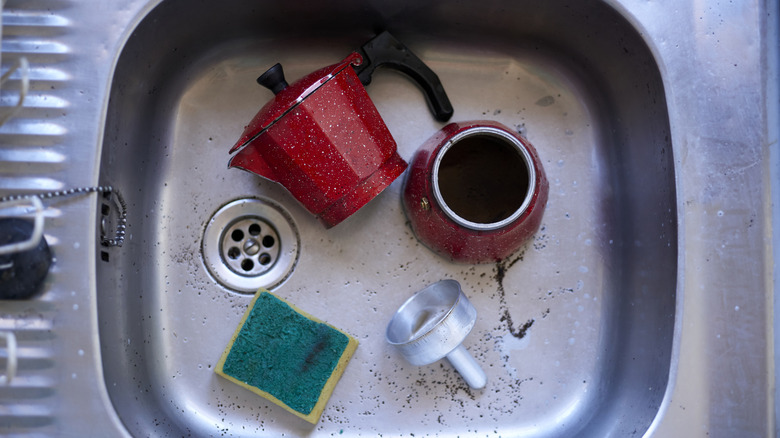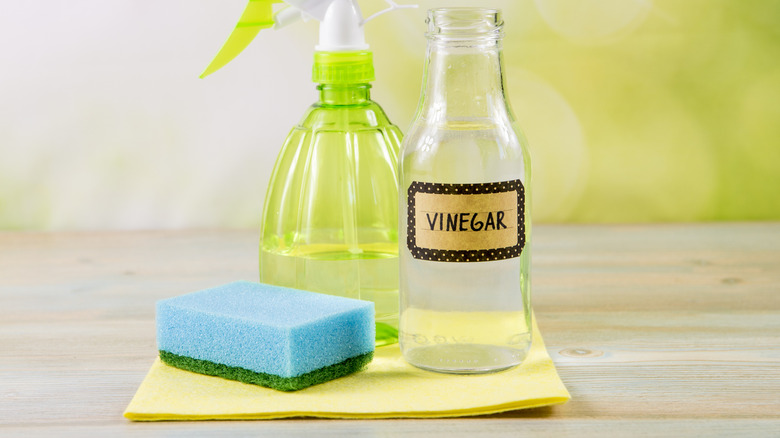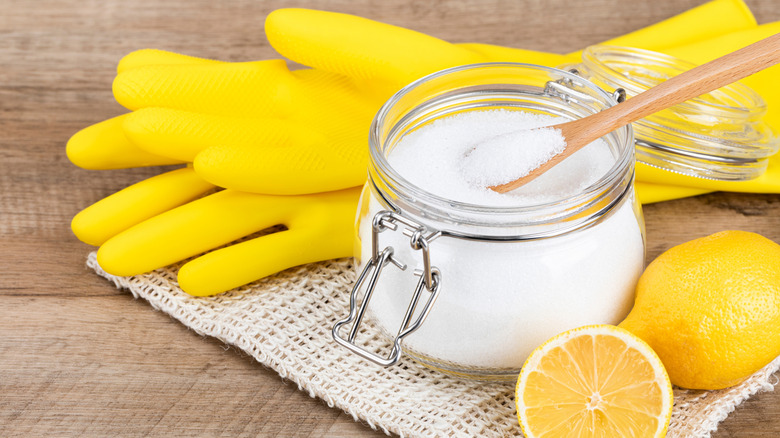Is It Safe To Clean Your Coffee Maker With Vinegar?
We may receive a commission on purchases made from links.
White vinegar is a multitalented kitchen cleaning all-star. You can use it to degrease your kitchen cabinets, get those gross stains off your Tupperware, or give wine glasses a French bistro-style sparkle. So, it stands to reason that you should be able to use vinegar to clean your coffee maker, too. That's where things start to get complicated. It all depends on what you mean by "clean" and "coffee maker." Cleaning could mean giving a carafe a quick wipe down or it could mean descaling, a more in-depth process meant to clean out a machine's inner workings.
If you just want to clean the grime off your machine, using vinegar is perfectly fine. Things get trickier when you need to descale, though. Descaling cleans out limescale, the chalky white residue deposited by tap water. Limescale is harmless for humans, but it's a little more dangerous for coffee machines. Too much limescale can permanently damage your machine.
Acids, like vinegar, help remove limescale. That's why many people recommend vinegar using as a descaling solution. Often, it's perfectly harmless: Some brands, like KitchenAid, even recommend using it to descale. Others — including Smeg — specifically warn against it. You could even void your warranty with that innocent vinegar rinse. According to these brands, vinegar can seriously damage your machine.
What's wrong with using vinegar?
Different coffee makers have different rules. Italian coffee brand Bialetti recommends using vinegar to descale its old-fashioned percolators, but not its modern, pod-based coffee system. Nespresso advises against using vinegar, too. Instead, this brand recommends using a branded descaling solution. There's a reason for this. High-tech machines have complex inner workings: Dissect your Nespresso and you'll find a mess of rubber tubes, seals, and metal. According to coffee machine manufacturers, vinegar can damage the rubber and metal components, ruining your machine.
But is vinegar really that bad, or are brands trying to trick you into buying their expensive descaling kits? Coffee forums are divided. Some commenters claim that vinegar is fine, others warn that it can destroy your coffee maker. This information is rife with inconsistencies, too. Some sources say that vinegar is too strong; it'll eat away at those delicate rubber parts. Other sources say that it's too weak. What gives? Well, you could say that vinegar is both too strong and too weak.
Most commercial limescale cleaners are made from citric acid, a non-toxic acid found in citrus fruit. Citric acid is milder than vinegar: Its pH clocks in at around three to six. By contrast, vinegar, which contains acetic acid, has a stronger pH of around two to three. But, while citric acid is weaker, its chemical composition makes it better at breaking down limescale. Not only does it do a better job descaling, it also does not damage the machine's delicate rubber parts. Citric acid has other benefits, too. Unlike vinegar, it doesn't leave a lingering taste or smell.
Should you use citric acid to descale your coffee maker?
I know, this all sounds like a disappointing win for Big Coffee, but shelling out for a descaling solution isn't the only way to get your hands on citric acid. Powdered citric acid costs just a few dollars per pound, and it's readily available online or in specialty food stores. For example, on Amazon you can buy an 8-ounce bag of Lemi Shine Food Grade Citric Acid for under $6.
Citric acid is safe, natural, and eco-friendly. That said, you should still proceed with caution. Some machines are pickier than others, and it can be tricky to get the proportions right when you're mixing the citric acid solution. A high concentration of citric acid could damage your machine and, like vinegar, it might void your warranty. (A general rule of thumb is to use 1 or 2 tablespoons of citric acid for every liter of water.) If you've shelled out for an expensive, complicated coffee maker, buying descaling solution might worth it.
Even though citric acid is generally a better option, vinegar is still a safe and effective cleaning solution for low-tech coffee makers. It'll work just fine for French presses or stovetop percolators, and it's an easy way to clean electric kettles, too. If you must use it for a more complicated machine avoid cleaning vinegar, which has a higher concentration of acid. Stick to plain white vinegar instead and dilute, dilute, dilute.


